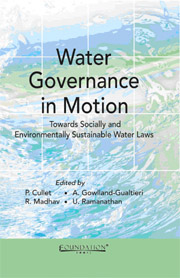Book contents
- Frontmatter
- Contents
- Acknowledgments
- Contributor Biographies
- Introduction
- I Water Law, Policy and Institutional Reforms in India
- II Ongoing Irrigation and Ground Water Reforms in India
- III Perspectives on Privatisation
- IV Environment and Human Rights
- 12 Balancing Development and Environmental Conservation and Protection of the Water Resource Base: The ‘Greening’ of Water Laws
- 13 The Right to Water as a Human Right or a Bird's Right: Does Cooperative Governance Offer a Way Out of a Conflict of Interests and Legal Complexity?
- 14 South Africa's Water Law and Policy Framework: Implications for the Right to Water
- 15 Respect, Protect, Fulfill: The Implementation of the Human Right to Water in South Africa
- V Comparative Perspectives on Reforms
- Bibliography
12 - Balancing Development and Environmental Conservation and Protection of the Water Resource Base: The ‘Greening’ of Water Laws
from IV - Environment and Human Rights
Published online by Cambridge University Press: 26 October 2011
- Frontmatter
- Contents
- Acknowledgments
- Contributor Biographies
- Introduction
- I Water Law, Policy and Institutional Reforms in India
- II Ongoing Irrigation and Ground Water Reforms in India
- III Perspectives on Privatisation
- IV Environment and Human Rights
- 12 Balancing Development and Environmental Conservation and Protection of the Water Resource Base: The ‘Greening’ of Water Laws
- 13 The Right to Water as a Human Right or a Bird's Right: Does Cooperative Governance Offer a Way Out of a Conflict of Interests and Legal Complexity?
- 14 South Africa's Water Law and Policy Framework: Implications for the Right to Water
- 15 Respect, Protect, Fulfill: The Implementation of the Human Right to Water in South Africa
- V Comparative Perspectives on Reforms
- Bibliography
Summary
Introduction
Many references to the term ‘sustainable development’ pervade discourses on the management of natural resources, particularly the diminishing supply of freshwater reserves worldwide. This entails reconciling the seemingly different goals of socio-economic development and environmental protection and conservation as essentially two sides of the same coin. Ultimately, efficient development strategies are those that sufficiently consider the finite nature of the water resource base and its dependent ecosystems. Addressing this concern, reforms in the water sector have increasingly mainstreamed environmental considerations into the elaboration of new laws or the review of existing legislation. This paper elucidates how environmental concerns are contained, reflected or given prominence within national water laws through a number of regulatory and other mechanisms – essentially, it examines the ‘greening’ of modern water laws.
The mechanisms examined in detail in this paper include minimum environmental flows of rivers, environmental impact assessment (EIA) requirements, the national ‘Reserve’ and protected areas and zones, environmental water trades and water trusts, ecosystem service payment schemes and the specific protection of aquifers in recognition of their ecosystem support function. This list is not exhaustive of the ways in which environmental protection is accommodated in the water law framework; indeed, many provisions contained in legislation which regulate water use incorporate the protection and conservation of surface or underground water bodies to some degree.
- Type
- Chapter
- Information
- Water Governance in MotionTowards Socially and Environmentally Sustainable Water Laws, pp. 333 - 358Publisher: Foundation BooksPrint publication year: 2010



